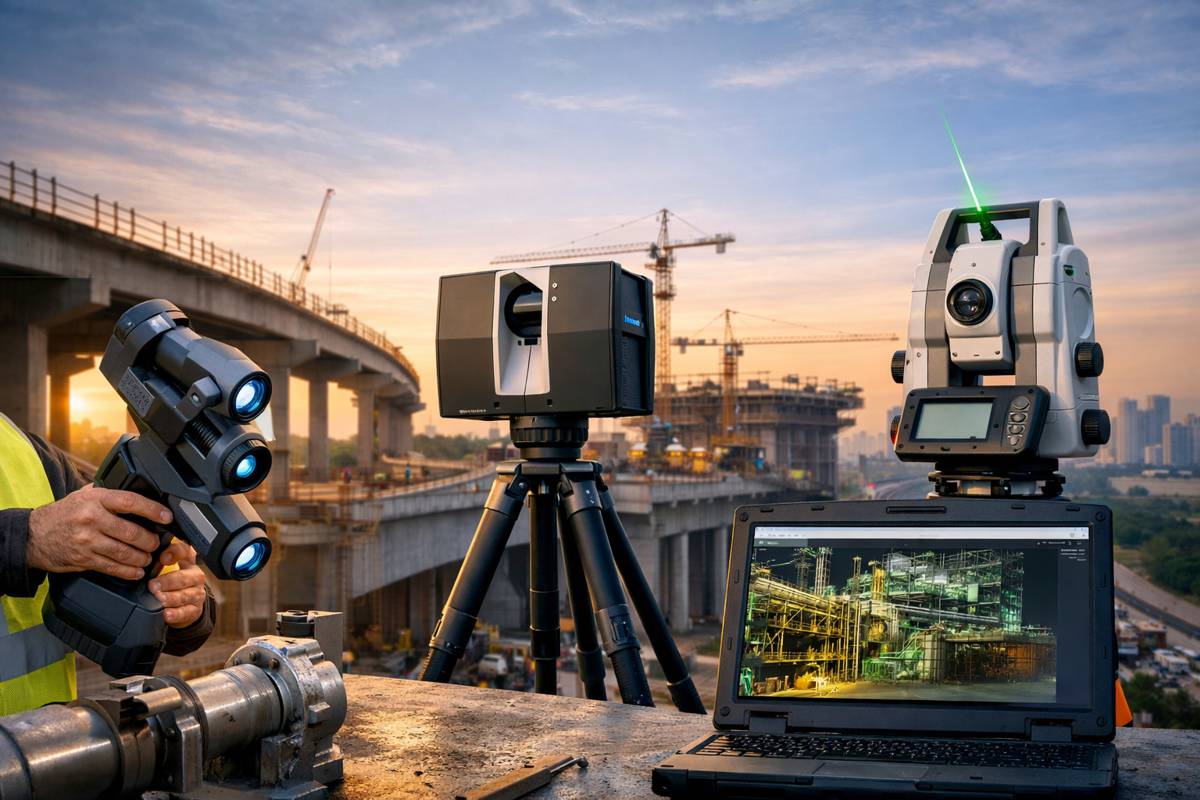Global Software Leaders Shaping The AI Era In 2025
The global software industry in 2025 is being rewritten in real time by artificial intelligence, data infrastructure, and industry-specific platforms that sit ever closer to critical operations. From core financial systems and defence analytics to construction management, clean energy and time‑critical logistics, software has become the connective tissue of the modern economy.
The Software Report’s Top 50 Software Companies of 2025 capture that shift. This cohort reflects a market where AI is no longer a side project but a design principle, where cloud infrastructure must be both high performance and sustainable, and where vertical specialists increasingly outpace generic tools. Capital is still flowing, yet investors are clearly favouring platforms that can prove operational impact, measurable outcomes, and durable recurring revenue.
Within this group, several themes emerge. AI‑ready data infrastructure and cloud platforms now underpin the most ambitious innovation. Vertical solutions for banking, insurance, construction, healthcare and public services are scaling quickly as organisations look for depth rather than breadth. Cybersecurity and secure infrastructure remain non‑negotiable as attack surfaces expand. And across the board, autonomous and agentic systems are quietly reshaping how people work.
What follows is an overview of the 50 recognised companies, highlighting how each contributes to this fast‑evolving landscape.
1. Starburst
Founded by the original creators of Trino (formerly PrestoSQL), Starburst has become a central player in AI‑ready analytics. The Boston‑based company helps enterprises analyse data across diverse systems without costly or risky data movement, making it easier to deploy AI at scale without re‑architecting entire estates.
Starburst’s open, hybrid data lakehouse platform supports analytics and AI at enterprise scale, allowing teams to query data where it lives while maintaining governance and performance. Co‑Founder and CEO Justin Borgman leads the business, which has raised more than $414 million, including a headline $250 million Series D and a 2025 strategic investment from Citi.
Fiscal 2025 was Starburst’s strongest year so far, with 20% growth in net new customers, a 76% jump in Starburst Galaxy adoption, and its largest‑ever contract: a multi‑year, eight‑figure agreement with a global financial institution. Its technology now powers analytics for 10 of the top 15 global banks, including HSBC, where it enables a virtual data lake for AI‑driven insights.
A partnership with Dell Technologies embeds Starburst’s query engine into Dell’s Data Lakehouse product as part of Dell’s AI Factory go‑to‑market initiative. That collaboration strengthens Starburst’s position in enabling retrieval‑augmented generation and other AI workflows that depend on governed, real‑time access to data.
2. CData Software
CData Software, headquartered in Chapel Hill, North Carolina, focuses on one of AI’s hardest problems: secure, reliable connectivity to live enterprise data. The company develops tools that simplify how organisations connect, integrate, and automate data across hundreds of cloud and on‑premise applications.
More than 10,000 businesses, including Intel, Bayer and FedEx, rely on CData’s integration technology. Under CEO and Co‑Founder Amit Sharma, the company has pursued steady, profitable growth since its founding. In June 2024, it raised $350 million from Warburg Pincus, Accel and Updata Partners, funding that accelerated international expansion and the acquisition of Data Virtuality.
In September, CData introduced Connect AI, a managed Model Context Protocol (MCP) platform that allows AI assistants to securely access live enterprise data from more than 300 systems. The launch extended CData’s established integration stack, already embedded by partners such as Palantir, SAP and Google Cloud, directly into the AI ecosystem, helping customers bridge the gap between advanced models and real‑world operational data.
3. Finastra
Finastra sits at the heart of global banking and payments. Its software powers payments, lending and treasury operations for more than 8,000 institutions in over 130 countries, including 45 of the world’s top 50 banks. Headquartered in Lake Mary, Florida, the company combines decades of financial expertise with a modern focus on cloud, APIs and open banking.
Finastra’s platforms help institutions process over $7 trillion in transactions daily and close a loan package roughly every two seconds. Over the past year, the company has reshaped its portfolio to focus squarely on banking and payments technology. In May it agreed to sell its Treasury and Capital Markets division to funds advised by Apax Partners, freeing resources to double down on digital payments innovation.
Around the same time, Finastra launched a modern ACH module within its Global PAYplus platform, a microservices‑based system built on Kafka that lets U.S. banks handle ACH, wires and real‑time payments from a single hub. CEO Chris Walters oversees this transformation, supported by Vista Equity Partners, which underpinned Finastra’s $5.3 billion private debt financing in 2023.
4. EquipmentShare
EquipmentShare illustrates how deeply software is now embedded in construction operations. The company combines smart jobsite systems with equipment rental, retail and service offerings to tackle longstanding inefficiencies across the sector.
Its proprietary T3 platform connects machines, people and materials in real time, giving contractors visibility into asset utilisation, location, maintenance and safety. Founded in 2015 by brothers Jabbok and Willy Schlacks and headquartered in Columbia, Missouri, EquipmentShare has grown to more than 340 locations across 45 states with over 7,000 employees.
A core pillar of its growth strategy is the OWN Program, a capital‑light model that sells fleet assets to investors who then lease them back under EquipmentShare management. As of March 2025, the programme represented $3.6 billion in fleet value, more than half of assets under management.
With $3.9 billion in trailing twelve‑month revenue, EquipmentShare now ranks among the largest equipment rental providers in the U.S. Its focus remains on building connected, data‑driven construction operations that prioritise efficiency, sustainability and scale.
5. Aurigo Software
Aurigo Software, founded in 2003 and headquartered in Austin, Texas, develops cloud‑based software for capital programme and construction management. Its Masterworks Cloud platform supports more than 300 public and private owners across North America, managing over $450 billion in active projects.
In 2025, Aurigo launched two AI products that extend its planning suite. Aurigo Lumina uses generative AI to interpret and analyse large infrastructure datasets, while Aurigo Primus applies predictive analytics and scenario modelling for private facility owners in sectors such as healthcare, manufacturing and data centres.
Under Founder and CEO Balaji Sreenivasan, the company has evolved from a project management provider into a full‑lifecycle planning platform. Aurigo’s focus remains on improving the accuracy, transparency and efficiency of capital decision‑making, particularly as governments and private owners step up investment in resilient infrastructure.
6. Actian
Actian, part of HCLSoftware, develops enterprise data management and intelligence technology used by more than 20,000 organisations and 42 million users in over 50 countries. From its base in Round Rock, Texas, the company provides the infrastructure many enterprises rely on to govern and prepare data for AI applications.
In October 2025, Actian released its Model Context Protocol Server, an addition to the Actian Data Intelligence Platform. The MCP Server connects AI assistants such as ChatGPT and Claude to governed, high‑quality data through a knowledge‑graph catalogue, making it easier to find related information and understand how data fits together.
CEO Marc Potter, who took the helm in 2023, has overseen the company’s expansion in data governance and AI enablement, including the acquisition of Zeenea in September 2024 and the relaunch of its unified data platform.
7. Phenom
Phenom provides advanced AI and AI agents for the human resources sector. The Philadelphia‑based company powers the Intelligent Talent Experience platform, which helps enterprises hire faster, develop talent more effectively and retain employees longer.
By connecting candidates, employees, recruiters and managers in a single ecosystem, Phenom aims to turn HR data into meaningful, real‑time insights that build stronger, more agile workforces. The company now supports thousands of organisations worldwide and operates across the U.S., India, Israel, the Netherlands, Germany and the UK.
Backed by B Capital Group, Dragoneer Investment Group, OMERS Growth Equity and GoldenArc Capital, Phenom has raised more than $100 million in Series D funding to accelerate its mission. In March 2025, it unveiled its biggest innovations yet, X+ Ontologies and X+ Agent Studio, a new generation of agentic AI systems designed to model role‑specific skills and automate the full talent lifecycle from sourcing and onboarding to learning and retention.
8. Stellar Cyber
Stellar Cyber delivers an open security operations platform that unifies detection, investigation and response across the full attack surface. Based in San Jose, California, the company serves more than 14,000 customers in over 50 countries, including one‑third of the world’s top 250 managed security service providers.
Stellar Cyber helps mid‑sized enterprises and MSSPs run high‑performing security operations centres with fewer tools and greater efficiency. In July 2025, it rolled out built‑in Identity Threat Detection and Response, integrating identity protection directly into its unified SecOps console to address the rise in credential‑based attacks.
Powered by its patented Multi‑Layer AI engine, Stellar Cyber’s platform speeds up threat detection, improves response times and reduces operational complexity. Founded by cybersecurity veterans Changming Liu and Aimei Wei, the company has raised over $100 million from investors including Highland Capital Partners, Northern Light Venture Capital and Samsung Next.
9. Phreesia
Phreesia is a healthcare automation company that streamlines the patient experience from check‑in and scheduling to payments and clinical support. Its technology helps reduce administrative work for healthcare providers.
Phreesia supports more than 170 million patient visits each year, partnering with leading health systems, insurers and life sciences organisations across the U.S. In 2025, the company took two major steps forward in its mission to improve patient access and affordability.
In September, it launched VoiceAI, an AI‑powered platform that handles patient calls, shortens hold times and connects seamlessly with provider workflows. That same month, Phreesia announced plans to acquire AccessOne for $160 million, broadening its ability to offer patients more flexible and transparent ways to manage healthcare payments.
Since co‑founding Phreesia in 2005, CEO Chaim Indig has led the company from a small startup to a publicly traded leader on the NYSE, following its $140.6 million IPO in 2019. For the quarter ending 31 July 2025, Phreesia reported $117 million in revenue, a 15% year‑over‑year increase.
10. Foundation Software
Founded in 1985, Foundation Software began as a construction accounting provider and has evolved into a comprehensive suite of management and financial tools for contractors. Headquartered in Strongsville, Ohio, the company now supports more than 43,000 construction professionals through its FOUNDATION platform, available both on‑premise and via SaaS.
Under CEO Michael Ode, Foundation has expanded its tools for payroll, project management, safety tracking, HR and estimating into an integrated ecosystem for contractors. Its approach emphasises centralised financial and operational control across all project stages.
In June, Foundation acquired Vendrix, adding expense management and AP automation to its portfolio and furthering its mission to give construction firms a unified system for financial oversight, from cost estimation to final billing.
11. CentralReach
CentralReach is a leading software and services platform for autism and intellectual and developmental disability care, empowering more than 200,000 professionals to deliver tech‑enabled support across home, school and workplace settings.
Built around an AI‑powered electronic medical record and workflow suite for ABA and multidisciplinary services, its Care360 strategy brings together outcomes measurement, real‑time video‑based supervision and predictive analytics to give providers and payors clearer visibility into clinical progress and quality of care.
CentralReach agreed to be acquired by Roper Technologies in March for approximately $1.65 billion. The deal is expected to add about $175 million in revenue and $75 million in EBITDA for the year ending 30 June 2026.
Later in the year, CentralReach acquired SpectrumAi and AI.Measures, integrating video capture, clinician decision support and severity‑adjusted assessments to help shift the industry toward outcomes‑based care alongside traditional fee‑for‑service models.
12. Prezent
Prezent, founded in 2021 and headquartered in Los Altos, California, provides an AI‑powered enterprise communication platform that helps organisations create and deliver business presentations at scale.
Its platform combines generative AI with structured communication frameworks to help teams produce professional, brand‑aligned presentations faster and more consistently. With Prezent, users can cut presentation creation time by up to 70 per cent and reduce agency costs by as much as 60 per cent.
Led by Founder and CEO Rajat Mishra, Prezent works with nearly 150 Fortune 2000 companies, particularly across biopharma and technology. At the heart of the platform is ASTRID, a multi‑disciplinary AI communication assistant that adapts to each organisation’s branding, tone and industry language.
In March 2025, Prezent raised new funding from True Global Ventures, Manulife Ventures and Alumni Ventures to support expansion into financial services, manufacturing and new markets across Europe and Asia.
13. LinkSquares
LinkSquares, based in Boston, helps in‑house legal teams move faster, work smarter and manage risk with its AI‑powered contract lifecycle management and legal operations platform.
The company serves more than 1,000 organisations, including DraftKings, Wayfair, ProPharma, TIME and the Boston Celtics, and is recognised as one of the fastest‑growing names in legal tech.
In May, LinkSquares introduced the Risk Scoring Agent, a new AI capability that automatically analyses contracts for risk using customisable profiles and real‑time assessments. It gives legal and business teams instant visibility into exposure so they can make faster, better‑informed decisions while strengthening compliance and governance across complex portfolios.
Founded in 2015 by CEO and Co‑Founder Chris Combs, LinkSquares has attracted funding from G2 Ventures, Sorenson Capital and Jump Capital to fuel continued innovation in predictive and generative AI.
14. Vercel
Vercel provides cloud infrastructure and developer tools that help teams build and scale high‑performance web applications. Its open‑source framework, Next.js, powers fast, AI‑enabled digital experiences for enterprises across industries.
Founded in 2015 by CEO Guillermo Rauch, the company has become a central player in web performance and AI infrastructure, serving customers such as OpenAI, PayPal, Walmart and Nike.
In September 2025, Vercel raised $300 million in a Series F round co‑led by Accel and GIC at a $9.3 billion valuation, with participation from BlackRock, Khosla Ventures and others. Annual recurring revenue surpassed $200 million, doubling in just 15 months as adoption of its AI Cloud and v0 developer assistant exceeded 3.5 million users worldwide.
15. Palmetto
Palmetto delivers software, financing and services that help homeowners adopt clean energy solutions, including solar, storage, HVAC and EV charging. Its Clean Energy Platform and LightReach plans aim to make decentralised energy adoption affordable and flexible.
Founded in 2010, Palmetto operates remotely with offices in Charlotte and Charleston, South Carolina. Chairman and CEO Chris Kemper, whose background spans policy and finance, leads the company’s mission to make consumer‑driven clean energy accessible nationwide.
Palmetto completed two securitisations in 2025 totalling $716 million and secured $1.2 billion in financing commitments from major institutions. The company reports around 300 new installations daily across 30 states, exceeding 1 TWh of clean power generated and 740,000 tonnes of carbon avoided.
16. Govini
Govini builds software that injects speed and data intelligence into the U.S. defence acquisition process. Its Ark platform integrates commercial and government data to help agencies plan, procure and sustain complex programmes, from logistics to modernisation.
Serving every branch of the U.S. military and major national security agencies, Govini has become a core analytics and AI partner across defence operations. CEO Tara Murphy Dougherty, a former Palantir executive and senior defence official, has guided the company’s expansion and growing strategic importance.
Govini surpassed $100 million in annual recurring revenue in 2025 and secured $150 million from Bain Capital to grow its engineering team and product suite. Recent engagements include a five‑year U.S. Army command‑and‑control initiative and a $919 million supply‑chain modernisation contract.
17. Vantaca
Vantaca develops AI‑powered software that automates workflows for community association management, covering finance, communications, budgeting and resident services.
Its HOAi platform reduces administrative work, allowing management companies to focus on service quality and growth. Led by CEO Ben Currin, a former U.S. Navy submarine officer and nuclear engineer, Vantaca has championed measurable efficiency gains, with over one million automated tasks and an estimated 100,000 hours saved for customers.
Founded in 2015 and headquartered in Wilmington, North Carolina, the company now supports more than 500 management firms representing six million U.S. households. In October, Vantaca received a $300 million minority investment from Cove Hill Partners at a $1.25 billion valuation, joining existing investor JMI Equity. The raise followed 95 per cent annual revenue growth and will fund expansion of its connected ecosystem linking management companies, vendors and residents.
18. Axelera AI
Axelera AI is a semiconductor company building AI inference solutions that combine digital in‑memory computing with a RISC‑V dataflow architecture. Its technology delivers high performance, low latency and strong energy efficiency across industrial automation, healthcare, retail, security and public safety.
In September, Axelera released the Metis M.2 Max, a compact accelerator that brings PCIe‑class performance to an M.2 form factor. It doubles processing speed for large language and vision models while adding enterprise‑grade security features such as secure boot with a provisioned root of trust.
Founded in 2021 and headquartered in Eindhoven in the Netherlands, Axelera AI is led by CEO and Co‑Founder Fabrizio Del Maffeo. The company has grown to more than 180 employees across 18 countries, with R&D centres in Belgium, Switzerland, Italy and the UK, and has raised around $120 million from investors including the European Innovation Council Fund, Samsung Catalyst Fund and Innovation Industries.
19. ProcessMaker
ProcessMaker is an AI‑driven business process automation company that helps enterprises streamline workflows, make smarter decisions and scale operations more efficiently. Founded in 2000 and based in Durham, North Carolina, the company serves thousands of organisations worldwide, from banks and universities to manufacturers.
ProcessMaker’s platform orchestrates complex workflows, integrating human tasks and AI agents. A major platform upgrade in spring 2025 introduced new tools that let organisations orchestrate AI agents directly within workflows and use enterprise‑specific data through retrieval‑augmented generation collections.
The company’s most recent funding round came in 2021, led by Aldrich Capital Partners, to accelerate product development and global expansion. Founder and CEO Brian Reale, a Fulbright Scholar and Duke University graduate, has led ProcessMaker since day one.
20. Snowplow
Snowplow, founded in 2012 by Alex Dean and Yali Sassoon, is a global leader in AI‑ready customer data infrastructure. The company helps digital‑first organisations such as Strava, HelloFresh, Auto Trader, Burberry and DPG Media create high‑quality behavioural data pipelines that fuel analytics and personalised experiences.
Snowplow powers data collection across two million websites and apps, processing more than one trillion events every month. In May, the company introduced Snowplow Signals, a real‑time customer intelligence system that unifies in‑session and historical data to drive AI copilots, personalisation engines and adaptive interfaces.
Under CEO and Co‑Founder Alex Dean, a University of Cambridge graduate and former Deloitte technologist, Snowplow has grown from an open‑source analytics project into a core enterprise platform for AI data operations.
21. impact.com
Operating in more than 20 countries, impact.com provides a partnership management platform used by over 5,000 global brands, including Shopify, Uber and L’Oréal. Its technology helps organisations manage relationships with affiliates, creators and publishers as an alternative to traditional advertising channels.
In the second quarter of 2025, impact.com added 900 new clients, expanded into Spain and appointed new regional leadership in Europe. Platform enhancements improved workflow automation and security for its Performance, Creator and Advocate products.
Founded in New York, impact.com raised $150 million in 2021 at a $1.5 billion valuation, led by Qatar Investment Authority and Providence Public. CEO David A. Yovanno has overseen the company’s expansion as consumer marketing shifts toward community‑driven influence.
22. Pondurance
Pondurance is a cybersecurity company providing risk‑based managed detection and response services that combine AI analytics with the expertise of human threat hunters and incident responders.
Designed for midmarket organisations that handle sensitive or regulated data, Pondurance delivers 24/7 monitoring, rapid threat response and proactive risk reduction through its U.S.‑based security operations centre. CEO Doug Howard, a 30‑year cybersecurity veteran and former RSA Global Services executive, leads the company’s mission to make advanced MDR accessible.
In March, Pondurance launched Platform 2.0, a major cloud‑native SaaS release that brings threat detection, vulnerability management, managed SIEM and automated remediation together in one unified interface. The platform integrates with leading EDR providers such as CrowdStrike, SentinelOne and Microsoft, along with hundreds of network, cloud and identity data sources.
23. Tamr
Born out of MIT’s Computer Science and Artificial Intelligence Laboratory in 2013, Tamr specialises in AI‑powered master data management to help large organisations connect, clean and unify their data so it becomes a genuine business asset.
Its “human‑in‑the‑loop” approach combines machine learning with expert input to deliver accurate, real‑time master data that powers analytics, operations and better customer experiences across sectors including finance, manufacturing, healthcare and technology.
Led by CEO Anthony Deighton, formerly of Celonis and Qlik, Tamr reported a 65 per cent increase in annual recurring revenue and a 50 per cent jump in its customer base in fiscal 2025. The company rolled out innovations including AI‑Powered Search, Tamr RealTime and the Virtual Chief Data Officer to give teams instant access to enterprise data and insights.
24. Kentik
Kentik provides network intelligence software that gives infrastructure teams real‑time visibility into how data flows across modern networks. Its platform unifies telemetry from cloud, devices, flow and synthetic monitoring to diagnose issues, optimise performance and strengthen security.
Started by network engineers, Kentik supports customers including Akamai, Booking.com, Dropbox, Zoom, Google and Moderna. Its analytics engine powers performance and resilience across data centres, clouds and the global internet.
In June 2025, Kentik introduced Cause Analysis, an AI‑powered feature that explains network slowdowns or outages in plain language, helping teams resolve incidents without deep specialist expertise.
25. SingleStore
SingleStore delivers a real‑time database platform for the AI era, combining transactional and analytical processing in a unified distributed SQL engine. Its core product, SingleStoreDB, enables organisations to ingest, analyse and act on data instantly, powering applications that rely on high‑speed, low‑latency insights.
Formerly known as MemSQL, the company serves more than 300 enterprises across over 50 countries and 40 industries, including NVIDIA, Goldman Sachs, Adobe, Samsung and Dell. Under CEO Raj Verma, SingleStore has reported more than $120 million in annual recurring revenue and continued global expansion.
In 2025, the company introduced major upgrades, adding AI and machine learning functions in SQL, Zero Copy Attach for rapid experimentation and Aura Analyst, a conversational analytics assistant. A growth buyout led by Vector Capital, joined by Dell Technologies Capital, Google Ventures, IBM and REV Venture Partners, further positions SingleStore for long‑term innovation.
26. Decerto
Decerto is a trusted technology partner to Europe’s top insurers, delivering configurable software platforms that power more than 80 per cent of Poland’s life insurance market. Its solutions span sales, customer service and product management, helping insurers move faster, cut costs and modernise legacy systems.
With nearly 20 years of experience and more than 200 successful implementations, Decerto serves clients such as Warta, Generali, PZU and Allianz. CEO Piotr Biedacha, a software engineer by training, has led the company since 2007.
In July 2025, Decerto strengthened its European footprint through a partnership with InterRisk TU SA Vienna Insurance Group to launch IRON, a new digital sales platform built on its proprietary Higson engine. The platform enables no‑code product configuration, real‑time premium calculations and a user‑first interface designed to boost agent productivity and improve customer experiences.
27. BriteCore
BriteCore designs cloud‑native core insurance software for property and casualty carriers and managing general agents. Its platform supports more than 100 insurers across North America, managing policy, billing and claims workflows in one integrated system.
Founded in 2009, BriteCore has received growth funding from Warburg Pincus, Radian Capital and WCF Mutual Insurance Company to advance its cloud infrastructure for mid‑sised insurers. CEO Ray Villeneuve leads its continued development of scalable, configurable solutions.
In September 2025, BriteCore rolled out updates focused on automation and cost efficiency, including advanced claims search, auto‑assignment of adjusters, dynamic correspondence generation and an embedded Stripe integration projected to reduce payment processing costs by up to 67 per cent.
28. Fleetio
Fleetio offers a cloud platform that helps organisations manage and optimise fleet operations across vehicles, drivers, equipment and service providers. Its software tracks performance, automates maintenance and provides real‑time visibility into costs and uptime.
The company supports more than 7,500 fleets in over 100 countries, managing eight million vehicles and processing 13 million repair orders annually through its network of 110,000 repair shops. Fleetio raised $450 million in Series D funding in March, co‑led by Elephant and Goldman Sachs Growth Equity, and acquired Auto Integrate, a maintenance‑authorisation platform, in the same month.
Founded in 2012 and based in Birmingham, Alabama, Fleetio continues to grow under CEO Jon Meachin, who emphasises automation, transparency and cost efficiency. In October 2025, it expanded its Maintenance Shop Network into Canada to support cross‑border fleets.
29. Instabase
Instabase develops an AI automation platform that enables enterprises to extract, process and act on unstructured document data across complex workflows. Its “context‑first” system transforms unstructured inputs into auditable, structured intelligence, automating critical processes such as claims handling, onboarding and compliance.
The platform supports major enterprises including Uber, NatWest, AXA and the U.S. Patent and Trademark Office, as well as four of the five largest U.S. banks. Designed for enterprise‑grade reliability and transparency, Instabase prioritises data accuracy, security and regulatory compliance.
Instabase has raised more than $275 million, including a $100 million Series D round in January led by the Qatar Investment Authority, with Andreessen Horowitz, Greylock Partners, Index Ventures and NEA also participating.
30. Tractian
Tractian provides an AI‑powered condition monitoring and asset performance platform that helps manufacturers prevent downtime and optimise production. Its system combines proprietary vibration sensors, software and machine learning to predict failures and guide maintenance decisions across industrial environments.
The company serves more than 500 customers across 1,000+ factories, with 100,000 sensors deployed for clients such as Bosch, Hyundai, Carrier and John Deere. Customers report average savings of around $6,000 per machine each year and strong returns on investment from predictive insights.
Tractian has raised $200 million, including a $120 million Series C round in December 2024 led by Sapphire Ventures. In March 2025, it partnered with Oracle Cloud Infrastructure to boost AI performance using NVIDIA H200 GPUs. CEO and Co‑Founder Igor Marinelli leads Tractian’s vision of an “industrial copilot” that unites human expertise and AI for next‑generation maintenance.
31. Optiv
Formed in 2015 through the merger of FishNet Security and Accuvant, Optiv helps organisations strengthen and scale their cybersecurity programmes. Headquartered in Denver, the company serves nearly 6,000 clients worldwide, including most of the Fortune 100, through strategy, implementation and managed services.
Its global operations span the U.S., Canada and India, supported by more than 450 technology partners. In 2025, Optiv marked its 10th anniversary with its latest Impact Report, noting more than 790,000 hours of cybersecurity services delivered and expanded federal capabilities through Optiv + ClearShark, which supports U.S. defence and intelligence agencies.
CEO Kevin Lynch, who joined Optiv after two decades at Deloitte, has led its evolution from a security reseller into a multi‑billion‑dollar integrator and trusted cyber risk advisor.
32. Exaforce
Exaforce develops AI‑native software that automates the full security operations lifecycle, helping enterprises detect, investigate and respond to threats with greater speed and precision. Its Agentic SOC Platform combines multi‑model AI with autonomous agents, or “Exabots”, to deliver real‑time insights, proactive detection and automated remediation through a single unified interface.
In April, Exaforce raised $75 million in Series A funding led by Khosla Ventures, Mayfield and Thomvest Ventures to expand its platform globally. In August, the launch of its agentic SOC system extended AI beyond Tier‑1 triage to cover every stage of security operations, from threat detection and investigation to response and continuous improvement.
The company is led by Co‑Founder and CEO Ankur Singla, a seasoned entrepreneur who previously led Volterra and Contrail Systems to successful acquisitions by F5 and Juniper Networks. Based in the San Francisco Bay Area, Exaforce continues to advance AI‑driven security operations for enterprises seeking measurable gains in efficiency and resilience.
33. JobNimbus
JobNimbus develops cloud‑based CRM and project management software for roofing, fencing and exterior contractors, helping teams streamline operations from lead to payment. Its platform centralises scheduling, communication, payments and workflow automation so contractors can manage projects efficiently and scale with clarity.
Founded in 2013 in Lehi, Utah, by Ben Hodson, Nick Wood and Jason Wood, JobNimbus was created to give contractors practical tools to run stronger, more organised businesses. Drawing on backgrounds in technology and entrepreneurship, the founders built a system designed around the idea that contractors are the “heroes” of their communities.
Today, JobNimbus supports thousands of contracting businesses nationwide and reports measurable improvements in project delivery and payment speed. The company secured a $330 million growth investment in November 2024 from Sumeru Equity Partners, with continued backing from Mainsail Partners and the founders.
34. Mezmo
Mezmo delivers intelligent telemetry orchestration software that helps organisations manage, optimise and act on observability data in real time. Its Active Telemetry platform unifies logs, metrics and traces through active engagement, routing and in‑stream analysis, enabling faster visibility and more efficient operations across complex systems.
In May 2025, Mezmo restructured its pricing model to reduce observability storage costs by up to 90 per cent, followed in June by new optimisation workflows for Datadog users to identify redundant data and lower log volume. Together, these updates strengthened Mezmo’s Telemetry Pipeline, improving cost predictability, reducing noise and enhancing responsiveness for developers and SRE teams.
Headquartered in San Jose, California, Mezmo has been recognised for its rapid growth and continues to refine how modern organisations extract value from telemetry data.
35. Virtru
Virtru delivers data‑centric security software that keeps encryption and access controls attached to the data itself, whether shared by email, stored in the cloud or transmitted through collaboration tools. The company’s technology is built on the Trusted Data Format, a security standard invented by Co‑Founder Will Ackerly, a former NSA cloud security architect.
Virtru’s origins trace back to the years following 9/11, when brothers John and Will Ackerly recognised the lack of technology that allowed information to be shared securely without sacrificing privacy. That need to balance collaboration and control led to the development of TDF and the creation of Virtru in 2012.
Today, the company protects more than 6,700 customers and one million active users, securing roughly six million emails and files every week. Its software integrates with Gmail, Outlook, Google Drive and Microsoft 365, and is FedRAMP‑authorised for U.S. government use. In July 2025, Virtru raised $50 million in a round led by ICONIQ to expand TDF adoption across AI and defence.
36. Manychat
Manychat provides automation tools that manage customer conversations across Instagram DMs, WhatsApp, Messenger, TikTok and other platforms. Its technology helps small teams and creators convert engagement into leads and sales by connecting chat interactions directly to business results.
In October, the company launched Follow to DM, a Meta‑approved feature that automatically messages new Instagram followers, simplifying first contact and reducing inbox work. As of April 2025, Manychat served about 1.5 million customers in 170 countries, ranging from global brands such as Nike and The New York Times to individual entrepreneurs.
Founded in 2015 and based in Palo Alto, California, Manychat has raised $140 million in Series B funding led by Summit Partners to enhance its AI capabilities and expand go‑to‑market efforts.
37. Rescale
Rescale operates a cloud‑based digital engineering platform that unites simulation, modelling, AI and data intelligence to accelerate innovation across industries such as aerospace, automotive, life sciences, energy and manufacturing.
Its technology enables engineers to design, test and optimise complex products faster using scalable cloud computing. In April 2025, Rescale raised $115 million from investors including Applied Materials and NVIDIA, bringing total funding to more than $260 million.
The company later introduced Data Intelligence, a system that unifies legacy and modern simulation data into a single digital thread, a step toward its forthcoming AI Physics OS. Based in San Francisco and led by CEO and Founder Joris Poort, Rescale sits at the intersection of high‑performance computing and applied AI.
38. BuildOps
BuildOps develops an all‑in‑one cloud platform for commercial specialty contractors in HVAC, plumbing and electrical trades. Its software integrates service management, scheduling, invoicing and project tracking, allowing contractors to manage operations seamlessly from field to finance.
Headquartered in Los Angeles and led by Co‑Founder and CEO Alok Chanani, a former U.S. Army Captain, BuildOps serves subcontractors modernising large‑scale commercial projects across North America.
Backed by Meritech Capital, Founders Fund, Next47 and 01A, the company continues to expand through initiatives such as BuildOps Forge and Tyson for the Trades, helping contractors streamline communication, reduce manual work and improve profitability amid labour and modernisation challenges.
39. Pentera
Pentera delivers automated security validation software that continuously tests enterprise defences by safely simulating real‑world cyberattacks. Its platform identifies exploitable vulnerabilities across internal, external and cloud environments, helping organisations prioritise remediation.
Founded in 2015 with origins in Tel Aviv and now headquartered in Boston, Pentera serves more than 1,200 enterprises across 60 countries, achieving 300 per cent growth in annual recurring revenue over the past four years.
Under CEO Amitai Ratzon, the company has expanded its capabilities through acquisitions of DevOcean and EVA Information Security in late 2025, integrating AI‑driven remediation and red‑teaming tools. Pentera raised $60 million in Series D funding in March, led by Evolution Equity Partners, valuing the company above $1 billion.
40. Nextworld
Nextworld builds an AI‑driven enterprise applications platform that combines ERP functionality with a no‑code development environment, enabling businesses to create and evolve software without the limitations of legacy systems or technical debt.
The Denver‑based company is led by Founder and CEO Kylee McVaney, whose family founded J.D. Edwards. Nextworld serves enterprises across manufacturing, distribution and technology sectors.
In February 2025, the company raised $65 million in Series F funding led by the McVaney Investment Partnership to accelerate AI innovation and global expansion. Later in the year, Nextworld introduced a two‑tier transparent pricing model, Starter and Unlimited, eliminating per‑user fees and reinforcing its focus on simplicity and scalability.
41. HUMAN
HUMAN protects digital ecosystems from bots, fraud and automated abuse through its Human Defense Platform, which authenticates more than 20 trillion digital interactions every week across advertising, e‑commerce, enterprise and government systems.
Its technology uses real‑time threat detection, behavioural analysis and adaptive AI to ensure every interaction is genuine. Founded as White Ops in Brooklyn in 2012 and now headquartered in New York City, HUMAN is led by CEO Stu Solomon, a former president of Recorded Future and U.S. Air Force Academy graduate.
HUMAN’s Satori Threat Intelligence and Research Team tracks and dismantles emerging bot networks, providing live intelligence to clients and partners worldwide. The company raised more than $50 million in growth funding in October 2024, led by WestCap with participation from Goldman Sachs, ClearSky, NightDragon and Vertex Ventures US.
42. MenuSifu
MenuSifu provides a restaurant management and point‑of‑sale platform that unifies ordering, payments, kitchen operations and analytics in one ecosystem. Its technology supports front‑ and back‑of‑house automation, robotic cooking systems and AI‑powered insights that drive efficiency and cost savings.
The company serves more than 15,000 restaurants across the U.S., particularly within the Asian dining segment, and offers solutions spanning marketing, delivery integration and contactless payments. Headquartered in New York with more than 300 employees, MenuSifu operates in all 50 states.
MenuSifu raised a Series B funding round in March from investors including Challenjers Capital, Enlight Growth Partners, Lingfeng Capital, Amino Capital and Grandview VC. Co‑CEOs William Wang and Yu Li lead efforts to modernise restaurant operations through AI and connected technologies.
43. AgentSync
AgentSync builds infrastructure that connects carriers, agencies, MGAs and producers across the insurance industry. Its automated, cloud‑native platform streamlines licensing, onboarding and compliance, helping insurers scale faster while reducing risk and cost.
By combining APIs, automation and customer‑centric design, AgentSync delivers operational visibility and flexibility across complex distribution networks. Today, the platform supports more than 200 insurance organisations and serves as core infrastructure for many of the U.S.’s leading carriers.
The company appointed David Samuels as CEO in October 2025, succeeding Co‑Founder Niji Sabharwal, who became Executive Chair. Backed by more than $160 million from investors including Craft Ventures and Valor Ventures, AgentSync continues to modernise insurance distribution.
44. Opkey
Opkey delivers an AI‑powered platform that modernises and manages enterprise ERP systems throughout their lifecycle. Combining process mining, intelligent automation and agentic AI, its technology streamlines configuration, testing, training and support, cutting testing time and operational costs for large organisations.
At its core is Argus AI, a specialised small language model trained on decades of enterprise data and domain expertise. Argus coordinates intelligent agents to automate ERP operations in real time, creating a self‑optimising system compatible with Oracle, Workday, Coupa, Veeva and other platforms.
Opkey serves more than 250 enterprise customers, including over 70 per cent of the Fortune 1000, and partners with KPMG, PwC and Huron. The company raised a Series B round in 2024, led by PeakSpan Capital with participation from UST Global, to expand its AI‑driven optimisation suite.
45. Iru
Iru builds an AI‑powered platform that unifies identity management, endpoint security and compliance automation for enterprise IT teams. Its system replaces fragmented point tools with a single environment that secures users, devices and applications while automating access control and compliance validation.
Emerging from the creators of Kandji, known for Apple device management, Iru extends those principles of simplicity and automation to broader IT and security challenges. With AI embedded directly into its architecture, the platform delivers adaptive threat detection and real‑time policy enforcement across networks.
Serving more than 5,000 organisations worldwide, including GoCardless, Forward Financing and Demandbase, Iru helps enterprises simplify technology stacks and improve visibility.
46. Relay
Relay provides a connected communication platform that replaces traditional two‑way radios with intelligent, voice‑first technology. Its devices and software deliver real‑time translation in more than 30 languages, GPS tracking, panic alerts and dual WiFi‑cellular coverage, keeping distributed teams connected and secure.
The system supports frontline workers in sectors such as hospitality, logistics and manufacturing, offering communication and visibility tools historically unavailable to non‑desk employees. A cloud dashboard gives managers real‑time insights into team activity, enabling faster coordination and safer operations.
With more than 2.5 billion messages delivered, one million mapped locations and adoption across more than 2,500 organisations, Relay has become a key communication platform for the frontline workforce.
47. WEKA
WEKA develops data infrastructure for high‑performance AI and accelerated computing. Its flagship platform, NeuralMesh by WEKA, unifies data, compute and networking across edge, core and cloud environments, removing storage bottlenecks and boosting efficiency for large‑scale AI workloads.
Led by Co‑Founder and CEO Liran Zvibel, WEKA’s software is deployed by more than 300 organisations worldwide, including 11 Fortune 50 companies and leading AI research institutions. In October 2025, the company launched its next‑generation NeuralMesh architecture for NVIDIA BlueField‑4, delivering significant energy‑efficiency gains for agentic AI processing.
WEKA has raised $140 million in Series E funding from Valor Equity Partners, NVIDIA, Norwest Venture Partners, Micron Ventures and Qualcomm Ventures, valuing the company at $1.6 billion.
48. Corelight
Corelight offers open network detection and response technology, enabling security teams to detect, investigate and disrupt complex cyber threats. Its platform converts raw network and cloud activity into structured, evidence‑based insights that enhance visibility across hybrid and multicloud environments.
Built on more than two decades of open‑source innovation from Zeek, the industry‑standard network security framework, Corelight was founded in 2016 and is headquartered in San Francisco. CEO Brian Dye, formerly of McAfee and Symantec, has guided the company through its evolution into a leader in open NDR.
Backed by $150 million in Series E funding from Accel, Cisco Investments and the CrowdStrike Falcon Fund, Corelight launched Corelight Threat Intelligence in October 2025, integrating CrowdStrike IOC feeds to improve detection accuracy and reduce false positives.
49. MariaDB
MariaDB’s open‑source database platform supports transactional, analytical and hybrid workloads across private, public and multicloud environments. Used by more than 600 organisations, including Deutsche Bank, DBS Bank, ServiceNow and Samsung, the platform delivers enterprise‑grade performance with the flexibility and cost efficiency of open source.
Started by members of the original MySQL engineering team in 2013, the company operates from Silicon Valley and Ireland. In 2025, MariaDB reacquired SkySQL, its database‑as‑a‑service offering, consolidating its managed cloud capabilities under MariaDB Cloud, which runs on AWS, Google Cloud and Azure.
Earlier in the year, the company acquired Codership, developer of Galera Cluster, strengthening high‑availability and replication technology. CEO Rohit de Souza, a veteran of Micro Focus and Actian, is steering the company’s evolution into a fully enterprise‑ready database platform designed for AI‑driven workloads and long‑term scalability.
50. Airspace
Airspace manages time‑critical logistics for shipments requiring precision and reliability, from transplant organs and medical devices to aerospace components. Its automated platform provides full visibility from order to delivery, using AI to predict disruptions and adjust routes dynamically.
Founded in 2015 by Nick Bulcao and Ryan Rusnak, Airspace operates in 134 countries, tracks more than 16,000 touchpoints per shipment and supports 20 per cent of the Fortune 100. Its team of over 300 spans five global offices and holds 11 patents.
The company has raised $138 million, including a $70 million round in 2022 from DBL Partners, Telstra Ventures and HarbourVest, to fuel global expansion into Europe and Asia and new verticals such as semiconductors, automotive and cleantech. With a Net Promoter Score close to 60 and 99.8 per cent retention, Airspace continues to advance intelligent, transparent and sustainable logistics.
Software At The Centre Of A Connected Economy
Seen together, these 50 companies show how deeply software and AI now sit inside the world’s most critical systems, from public infrastructure and banking to healthcare, defence and clean energy. The common thread is not simply code, but the ability to turn data into decisions, and decisions into measurable outcomes at industrial scale.
Whether it is a construction fleet running on connected telematics, a defence agency reshaping its supply chain, or a hospital easing the burden on frontline staff, software is increasingly the operating system of the real world. The 2025 cohort of Top 50 Software Companies stands out not only for technical excellence, but for the practical transformations they are driving across the global economy.




















